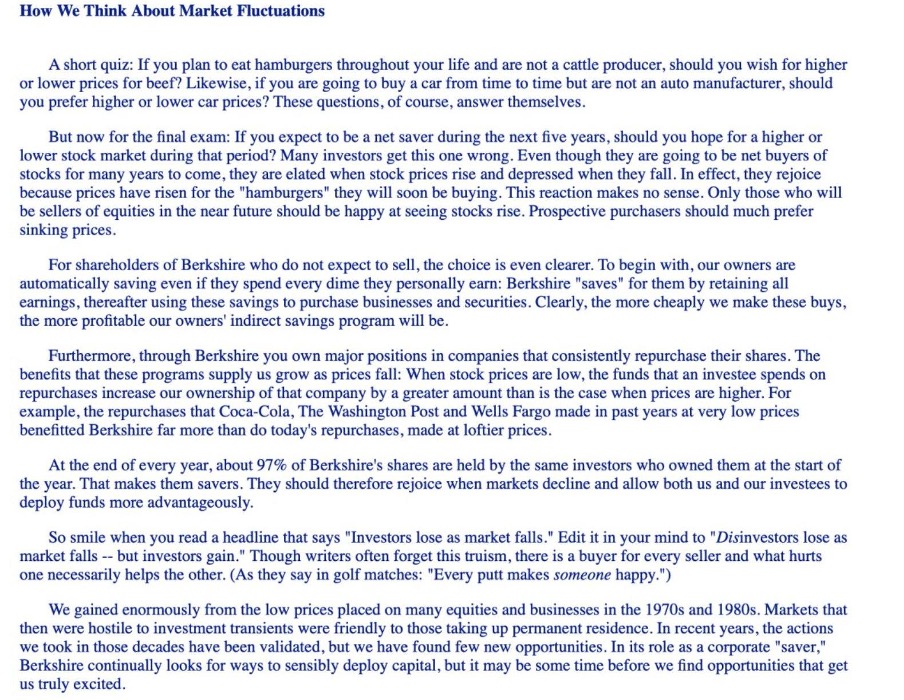How we think about market fluctuation

Iosi Pratama

Iosi Pratama
I found this article as an image on twitter and was on my phone storage for a while. It seems written by Warren Buffet for Berkshire Hathaway (BRK) shareholders. Its very interesting especially how we should see decline in stock market price as a long term investor. I belive this is worth to share on personal blog as well.

A short quiz: If you plan to eat hamburgers throughout your life and are not a cattle producer, should you wish for higher or lower prices for beef? Likewise, if you are going to buy a car from time to time but are not an auto manufacture, should you prefer higher or lower car prices? These questions, of course, answer themselves.
But now for the final exam: If you expect to be a net saver during the next five years, should you hope for a higher or lower stock market during that period? Many investors get this one wrong. Even though they are going to be net buyers of stocks for many years to come, they are elated when stock prices rise and depressed when they fail. In effect, they rejoice because prices have risen for the “hamburgers” they will soon be buying. This reasction makes no sense. Only those who will be sellers of equities in the near future should be happy at seeing stocks rise. Prospective purchasers should much prefer sinking prices.
For shareholders of Berkshire who do not expect to sell, the choice is even clearer. To begin with, our owners are automatically saving even if they spend every dime they personally earn: Berkshire “saves” for them by retaining all earnings, thereafter using thse savings to purchase business and securities. Clearly, the more cheaply we make these buys, the more profitable our owners’s indirect savings program will be.
Furthermore, through Berkshire you own major positions is companies that consistenly repurchase their shares. The benefits that these program supply us grow as prices fall: When stock prices are low, the funds that an investee spends on repurchases increase our ownership of that company by a greater amount that in the case when prices are higher. For example: the repurchase that Coca-Cola, The Washington Post and Wells Fargo made in past years at very low prices benefited Berkshire for more than do today’s repurchases, made at loftier prices.
At the end of every year, about 97% of Berkshire’s shares are held by the same investors who owned them at the start of the year. That makes them savers. They should therefore rejoice when market decline and allow both us and our investees to deploy funds more advantageously.
So smile when you read a headline that says “Investors lose as market fails”. Edit it in your mind to “Disinvestor lose as market falls — but investor gain” Though writer often forget this truism, there is buyer for every seller and what hurts once necessarily helps the other. (As they say in golf matches: “Every putt makes someone happy”)
We gained enormously from the low prices placed on many equities and business in the 1970s and 1980s. Market that then were hostile to investment transients were friendly to those taking up permanent residence. In recent years, the action we took in those decades have been validated, but we have found few new opportunities. In its role as a corporate “saver” Berskhire continually looks for ways to sensibly deploy capital, bit it may be some time before we find opporutnities that get us truly excited.